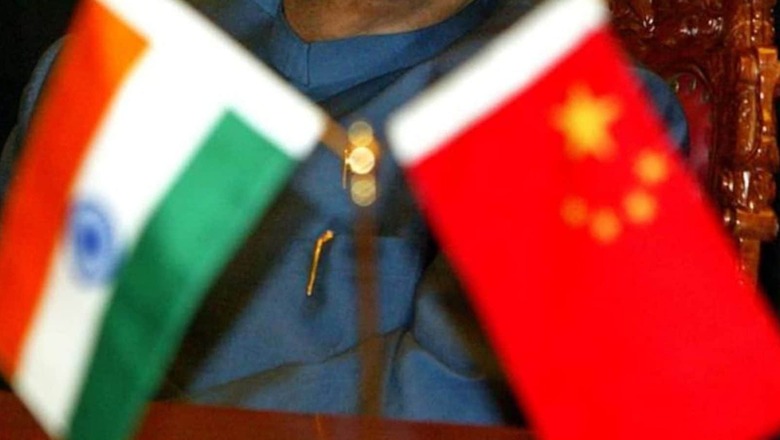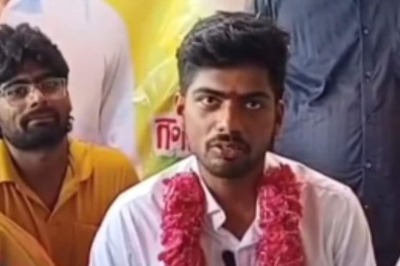
views
Chinese Ambassador to India, Sun Weidong called for keeping bilateral relations between India and China on the ‘right course’ on the occasion of the 72nd anniversary of establishment of diplomatic ties between the countries.
Weidong also asked Delhi to ‘stick to a long-term perspective, win-win mentality and cooperative posture’.
“Today marks the 72nd anniversary of establishment of diplomatic ties b/t #China & #India. Let’s stick to long-term perspective, win-win mentality & cooperative posture, keep the development of bilateral relations on the right course & bring more benefits to our peoples,” Weidong said on Twitter.
Weidong’s comments came after US Deputy National Security Adviser Daleep Singh referred to the “no limits” partnership between Moscow and Beijing and said no one believed that Russia would come running to India’s defence if China breaches the Line of Actual Control.
Western nations, which have imposed several sanctions on Russia after its military actions in Ukraine, have been attempting to pressurise other countries, including India, to follow the same path, experts say.
The eastern Ladakh border standoff between the Indian and Chinese militaries erupted on May 5, 2020, following a violent clash in the Pangong lake area. Both sides gradually enhanced their deployment by rushing in tens of thousands of soldiers as well as heavy weaponry. The two sides so far held 15 rounds of talks to resolve the standoffs at various points in eastern Ladakh.
While the talks till now have resulted in the resolution of issues in the North and South banks of Pangong Tso, Galwan and Gogra, India has been calling for a quick disengagement by China on the remaining friction points in eastern Ladakh such as Patrolling Point 15 (Hot Springs), Depsang Bulge and Demchok.
The Chinese military on Thursday had termed as “positive and constructive” the recently held 15th round of talks between the militaries of India and China to resolve the remaining issues related to the Ladakh standoff and said Beijing was firmly opposed to “interference from a third party”.
China and India have agreed to properly handle the border issue through negotiation and consultation but are firmly opposed to interference from a third party, Senior Colonel Wu Qian, spokesperson for the Chinese Ministry of National Defense (MND), told an online media briefing here.
He was reacting to the question on reported remarks by US Assistant Secretary of Defence for Indo-Pacific Security Affairs Ely Ratner stating that India is facing a severe situation from the Chinese side along the Line of Actual Control (LAC) to which the US is keeping a close watch. “China-India border issue is a matter between China and India,” China Military Online quoted Wu as saying.
Meanwhile, Chinese Foreign Minister Wang Yi in his recent visit to India had said he “keenly felt” that both sides had agreed to adhere to the leaders’ consensus that the two countries are not a threat to each other and handle and manage their differences.
During his unannounced visit to New Delhi on March 25, Wang, the first high level Chinese official to visit India after the April 2020 Ladakh standoff, held talks with National Security Advisor Ajit Doval and External Affairs Minister S Jaishankar.
Summing up the outcome his talks in New Delhi to the Chinese official media, Wang had said, “he has most keenly felt that both sides agreed to adhere to the important consensus of the two countries are not threats to each other but opportunities for each other’s development reached by the two heads of state, properly solve practical problems of common concern, handle and manage differences over the years, and promote the steady and sustainable development of bilateral ties”.
In his nearly three-hour “candid” talks with Wang, Jaishankar conveyed that the frictions and tensions triggered by China’s military deployments in the region since April 2020 cannot be reconciled with a normal relationship between two neighbours.
At a media briefing after the talks, Jaishankar said if both sides are committed to improving ties then this commitment must find “full expression” in the ongoing disengagement talks and that relationship is best served by observing the three mutuals — mutual respect, mutual sensitivity and mutual interests.
With PTI inputs
Read all the Latest News India and Breaking News here




















Comments
0 comment